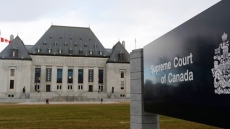OTTAWA — Canada's auditor general is taking issue with the quality of health care in remote First Nations communities, lacklustre efforts to rehabilitate prisoners and the dearth of oversight governing boutique tax credits — the Conservative government's election bauble of choice.
Many of the findings in Michael Ferguson's spring report to Parliament touch on some key planks of the government's likely election platform — protecting Canadians and cutting their taxes — while exposing more shortcomings in how the country's aboriginal population is treated.
"We are concerned that the issues we are seeing today may be the symptoms of bigger problems in the future if they are not addressed quickly," Ferguson said in a statement.
"It is important for departments to focus on addressing these issues promptly, to avoid bigger problems which will cost more to fix down the road, in terms of time, money and effort."
Ferguson's audit found that despite their big-ticket status, tax-based expenditures — boutique tax credit measures such as the children's fitness tax credit, for example — are not properly evaluated or subject to adequate oversight by Parliament.
He also concluded that Health Canada can't say for sure that all eligible First Nations individuals in remote communities in Manitoba and Ontario can access sufficient clinical and client care services and medical transportation.
The report found Canada lacks a national strategy to deal with the growing threat of antimicrobial resistance — the emergence and spread of drug-resistant infections, or "superbugs," due to the misuse of powerful antimicrobial drugs.
And it called out National Defence for failing to keep a closer eye on its former watchdog, who extended consultant contracts without proper authorization and approved his own hospitality expense claims.
Ferguson also found that lower-risk offenders are being released from prison later in their sentences and with less time supervised in the community because Correctional Service Canada recommends early release less often.
Some 80 per cent of offenders were behind bars beyond their first parole eligibility date, while more offenders are being released directly from medium- and high-security penitentiaries.
For the most part, the various departments and agencies agreed with Ferguson's recommendations to make improvements.
One audit found problems with the accessibility to health services in remote Ontario and Manitoba First Nations communities.
It concluded that only one out of 45 nurses had completed mandatory Health Canada training to allow them to perform advanced duties such as immunization, cardiac life support and handling controlled substances — a problem the federal department identified in 2010.
"We are concerned that this issue persists and that it could negatively affect the health services provided to First Nations individuals," the audit said.
The examination also found problems with the medical transportation system that allows patients to receive treatment that is only available outside their communities.
It found that some aboriginals were not properly registered for the transport benefit, and that there was a lack of documentation to show that the health care was actually needed or delivered.
An examination of Correctional Services Canada appears to dovetail with the Conservative government's tough-on-crime agenda, but it actually makes clear the safety of the public is better served by a system than can offer rehabilitation before an inmate is set free.
It found that CSC officials made fewer recommendations for early release to the Parole Board in 2013-14 than in 2011-12, including low-risk offenders, who as a result ended up spending less time being supervised in the community before their sentences ended.
The audit said only one in five offenders had parole hearings when they were first eligible, while 54 per cent walked out of federal prisons at their statutory release date rather than being on parole earlier in their sentence.
"This is important because the more time offenders have to gradually reintegrate into the community ... the more likely they are to reintegrate successfully," the audit said.
The supervised release of offenders "who have demonstrated responsibility to change contributes to public safety," it found.
Another audit raised questions about the fiscal impact of tax credits, or "tax-based expenditures" — one of the Conservative government's preferred methods to win the hearts and minds of voters.
It examined the first-time home buyers' tax credit, the children's fitness tax credit, a textbook tax credit and a search and rescue volunteers tax credit, all of them introduced during the Conservative tenure between 2006 and 2014.
The audit found that the Finance Department did not provide proper evaluations of tax expenditures the way it does when it evaluates actual program spending. It recommended the department cross-reference tax expenditures to direct program spending, and project their future costs.
"This audit matters because important programs are delivered through the tax system, and the resulting tax-based expenditures could account for tens of billions of dollars annually," the audit said.
"Furthermore, Parliament requires complete information on tax-based expenditures to exercise adequate oversight."





